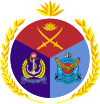Mohammad Azizur Rahman
Mohammad Azizur Rahman | |
|---|---|
মোহাম্মদ আজিজুর রহমান | |
| 11th Director General of Bangladesh Rifles | |
| In office 25 August 1996 – 30 December 1999 | |
| President | Abdur Rahman Biswas Shahabuddin Ahmed |
| Prime Minister | Sheikh Hasina |
| Preceded by | Ejaz Ahmed Chowdhury |
| Succeeded by | A. L. M. Fazlur Rahman |
| Personal details | |
| Born | 1 January 1945 Sylhet, Assam, British India |
| Spouse | Selina Aziz |
| Children | 2 |
| Alma mater | Jagannath University Murari Chand College |
| Awards | |
| Military service | |
| Allegiance | |
| Branch/service | |
| Years of service | 1968-1999 |
| Rank | |
| Unit | East Bengal Regiment |
| Commands |
|
| Battles/wars | Bangladesh Liberation War |
Mohammad Azizur Rahman (Bengali: মোহাম্মদ আজিজুর রহমান; born 1 January 1945) is a retired major general of the Bangladesh Army and a heroic freedom fighter of the Liberation War. For his bravery in the war of independence, the government of Bangladesh awarded him the title of Bir Uttam.[2]
He served as the Director General of Bangladesh Rifles from 25 August 1996 to 30 December 1999.[3]
Early life
[edit]Rahman was born on 1 January 1945 in Beanibazar of Sylhet district. His ancestral home is in Chattis villages of Ranaping in Golapganj. His father's name was Sarafat Ali and his mother's name was Mahibun Nesha. He had to study in Sunamganj, Habiganj and Sylhet as his father's workplace. He graduated from Sylhet MC College with an Intermediate and Jagannath College in Dhaka. His wife's name is Selina Aziz. They have one daughter and one son.[2][4][5]
Career
[edit]Azizur joined the army in 1966 and trained at the Pakistan Military Academy in Kakul. After commission in April 1968, he joined the 2nd East Bengal Regiment at Lahore. He was later transferred to Joydebpur in Dhaka with the 2nd East Bengal Regiment. He was promoted to the rank of major general through periodic promotions. In 1995, he was the area commander of Chittagong Region and GOC of the 24th Infantry Division. He served as the director general of Bangladesh Rifles from 25 August 1996 to 30 December 1999. He was the chairman of the Hill tracks Development Board and also served as the Ambassador of Bangladesh to Bahrain.[2][6]
Role in the war of liberation
[edit]On 9 April 1971, he was awarded the title of 'Bir Uttam' for his unparalleled bravery in the battle of Keenbridge over the Surma River in Sylhet.[2][6]
Awards and honors
[edit]References
[edit]- ^ Bangladesh Gazette of 15 December, 1973; Ministry of Liberation War Affairs
- ^ a b c d Unforgettable biography of the warriors of 1971, commemorative book (in Bengali). Bangladesh: Janata Bank Limited. 2012. p. 64. ISBN 9789843351449. Archived from the original on January 26, 2022.
- ^ "বর্ডার গার্ড বাংলাদেশ". bgb.gov.bd. Archived from the original on November 26, 2016. Retrieved 2022-01-27.
- ^ The heroic story of the freedom fighters of 1971 (in Bengali). Bangladesh: Prothoma Prokashon. 2013. p. 53. ISBN 9789849025375.
- ^ ডেস্ক, প্রথম আলো (August 2021). "মো. আজিজুর রহমান, বীর উত্তম". চিরন্তন ১৯৭১ | প্রথম আলো. Retrieved 2022-01-27.
- ^ a b Anwar Shahjahan (2017). Heroic freedom fighter awarded in the war of independence (in Bengali). Boipotro Prokashon. p. 756.
- Living people
- 1945 births
- Recipients of the Bir Uttom
- Director generals of Border Guard Bangladesh
- Bangladesh Army generals
- People from Sylhet District
- Jagannath University alumni
- Murari Chand College alumni
- People of the Bangladesh Liberation War
- Mukti Bahini personnel
- Candidates in the 1970 Pakistani general election
- Members of the Constituent Assembly of Bangladesh

